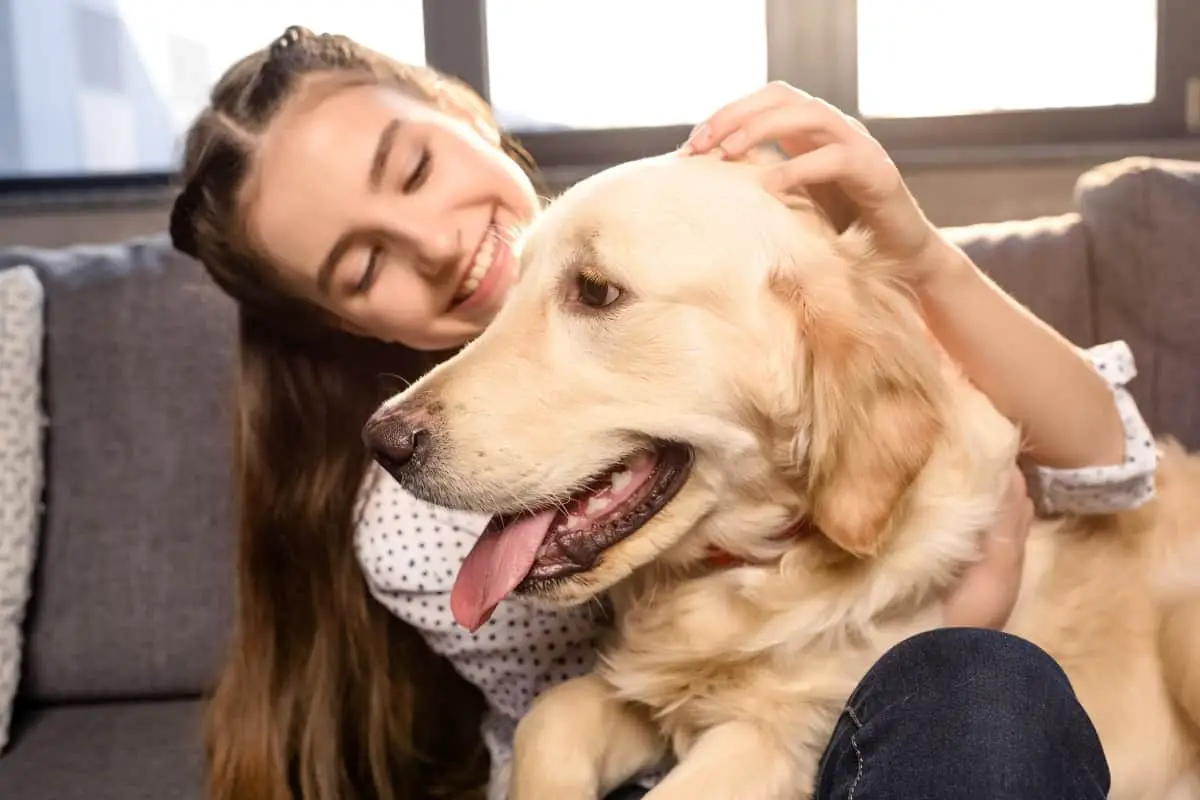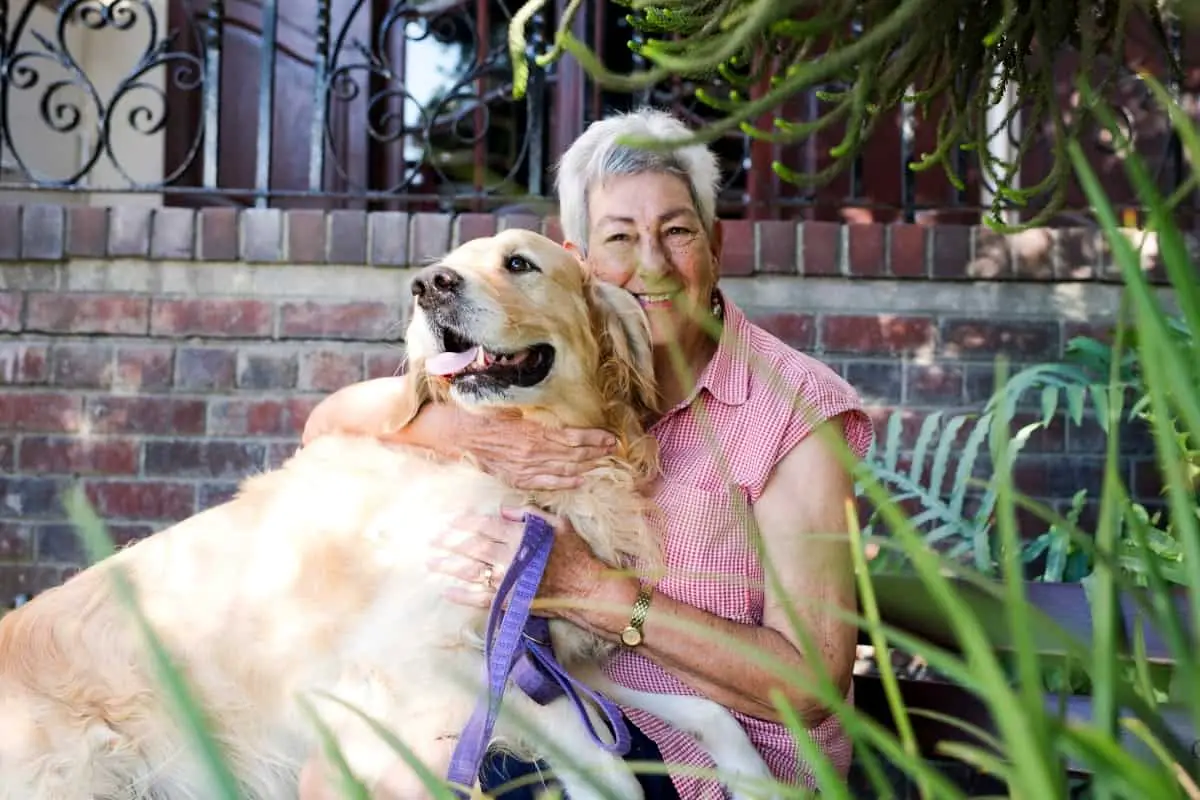When most people think of Golden Retrievers, they think of a high-energy and excitable breed of dog. For large families with an active lifestyle, they usually have no trouble burning off some of this excess energy. However, there are some cases where pent up energy can manifest as anxiety, and some Goldens may develop fear, anxiety, or phobias depending on several different factors.
Dogs with fear, anxiety, and stress can display many undesirable or even destructive behaviors. What are some other factors that cause anxiety in dogs? How can you train your Golden Retriever to be calm in these situations?
Table of Contents
What is Anxiety in Golden Retrievers?
Anxious dogs may display behavior that is synonymous with fear or stress. They may avert their face and eyes from the stress-inducing stimulus, or they may pin their ears back and down. Anxious dogs will tuck their tail between their legs and cower, and some will try to run away from the stressor.
In humans, anxiety is a type of emotion that causes increased fear and alertness. It is useful in situations where “fight or flight” are necessary, but this emotion is unhealthy when chronically expressed. The same holds true for anxiety in dogs.
Anxiety can also have a different appearance. There may be cases where a hyperactive and seemingly friendly dog is experiencing anxiety. These are dogs who may jump up and vocalize while also wagging their tail, which makes it easy to confuse with happy behavior. Even if the dog appears relaxed, they may engage in destructive chewing behaviors due to anxiety or boredom.
How to Calm Your Golden Retriever Down

Behavior modification is the most important step in training a dog how to be calm. In a sense, the brain needs to be “retrained” to be calm in the presence of a stressor and to switch “off” of anxiety as a default setting. Behavior modification can take weeks of desensitization and classical conditioning exercises.
Desensitization
Desensitization is when a dog is exposed to low amounts of the stimulus so that there is no reaction, and then the stimulus is gradually increased. An example of desensitization is when thunder sounds are used to help a dog overcome storm phobia. Positive reinforcements such as praise, treats, toys, etc. are given while the sound is gradually increased. Eventually, the dog learns to be calm in the presence of louder thunder sounds.
Classical Conditioning
Classical conditioning is when a dog learns something by association. For example, food-motivated dogs learn to come running at the sound of their bowl being filled or when the treat jar gets opened. So, if your dog is afraid of new people coming to your home, you can have visitors give treats to your dog. This way, they learn to associate new people with something positive. Positive reinforcement is what dogs love!
Social Interaction
Puppies and young adults are at the highest risk of hyperactivity and anxious behavior. These are the kinds of dogs that will jump up on people, bark or whine, and may also submissively urinate in certain situations. You can schedule play sessions in the same way you might schedule a daily workout routine. Make time for fetch or playing chase, and long walks or runs outside may help dogs to relax. Doggie daycares and time at the dog park are also great ways to burn off excess energy.
Dog Trainers
Training takes a lot of time and patience, and consistency is key. If you find that you are having difficulty with training, or you have a busy schedule, consider contacting a dog trainer. Most trainers have considerable experience when it comes to desensitization and classical conditioning. Some offer training sessions off-site or in your home.
Contact Your Veterinarian
In situations where a Golden Retriever is too anxious to be trained adequately, you may need to contact a veterinary behaviorist. These are special veterinarians who have had additional schooling on animal behavior. They can give you detailed reports specially tailored for your golden. Behaviorists are well-versed on training tactics and can prescribe the right combination of anxiety medications, if needed. If something needs to be approached differently, behaviorists can quickly follow up with you.
Other Options for Golden Retriever Anxiety

While training is an integral part of modifying anxious behavior, dogs who are too anxious to learn anything will take longer to improve. Many owners and veterinarians like to start with products that are naturally calming in order to facilitate learning.
Diets and Supplements
Diets and supplements exist that contain ingredients which are naturally calming. Active ingredients include amino acids that are involved in the synthesis of serotonin, aka the “happy” hormone, and milk proteins that mimic calming hormones from a mother’s milk. Pheromone products also work in a similar manner and are considered aromatherapy. Special probiotics are also available and have been clinically shown to have a calming effect due to the link between the digestive tract and the nervous system.
Medication
There are some situations that call for anxiety medications. Medications like trazodone and alprazolam may be prescribed in the short-term or for stressful events while longer-acting medications like fluoxetine and clomipramine can help with severe anxiety. There is also ongoing research to see if the use of CBD oil can help relax an anxious dog.
Conclusion
Stress and anxiety in Golden Retrievers can be frustrating, but it is important to remember that your canine companion needs your help. With patience and time, you can have a calm and more relaxed best friend!
If you have other areas that you would like to work on with your Golden, be sure to check out our Complete Guide to Training Your Golden Retriever. It will help bring you and your dog closer than ever!

